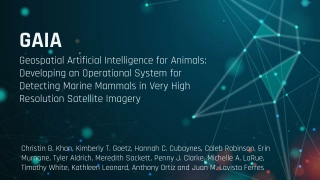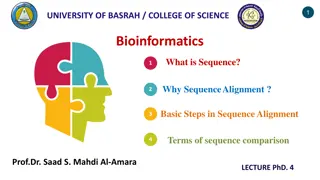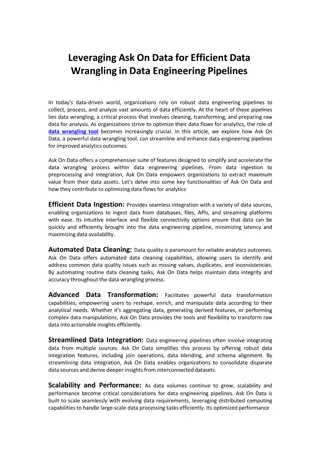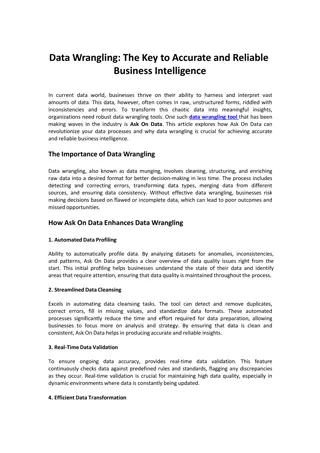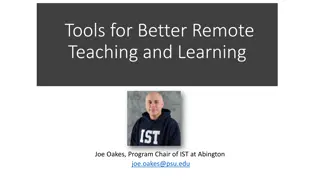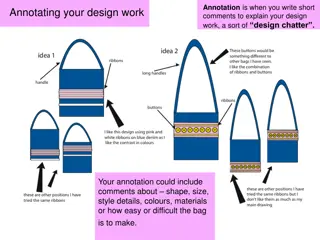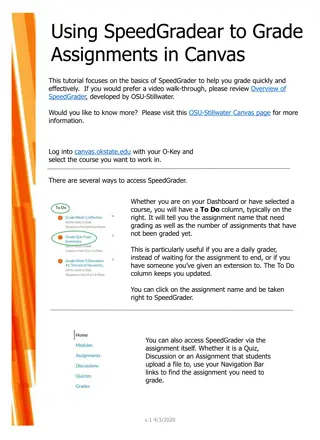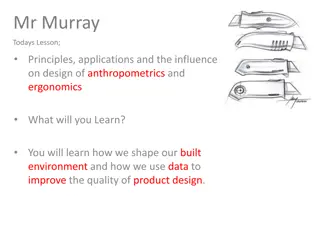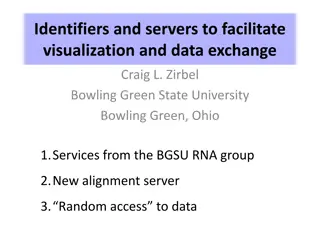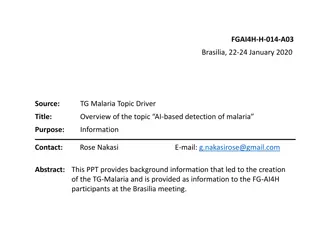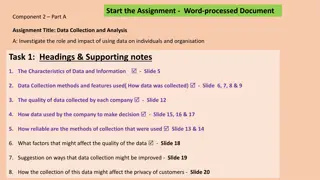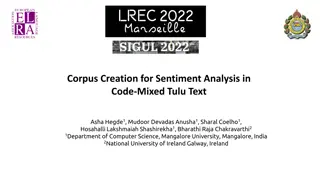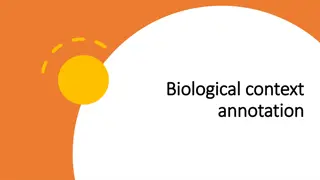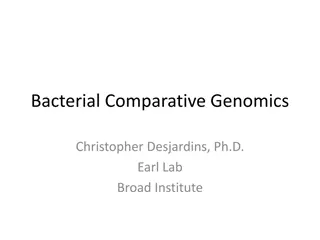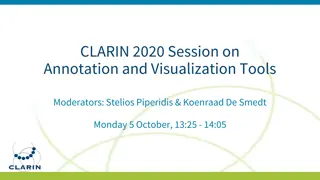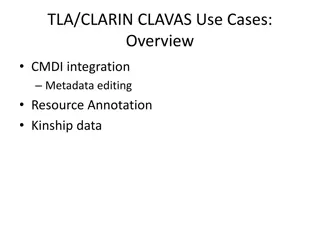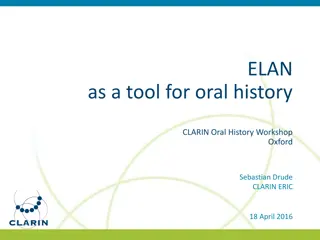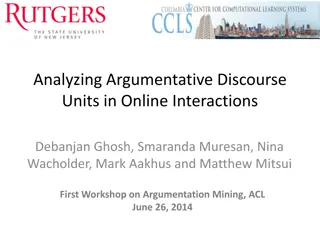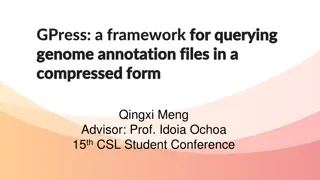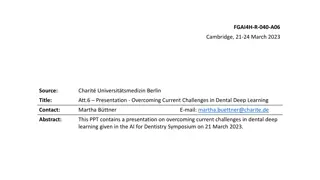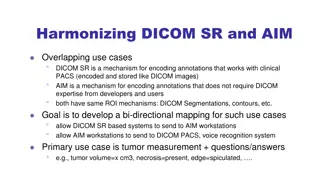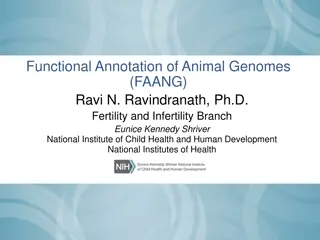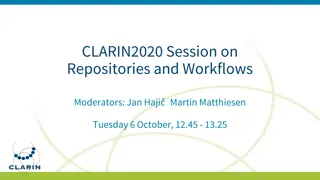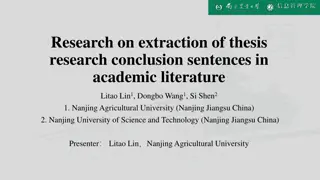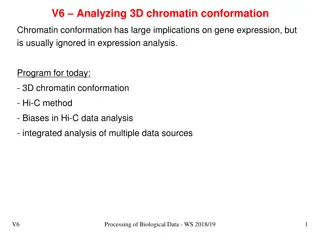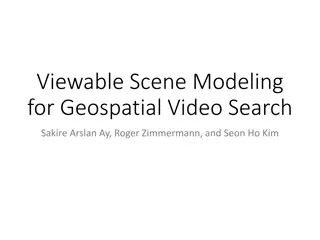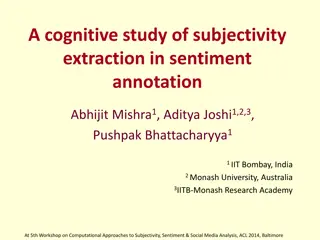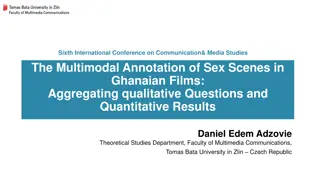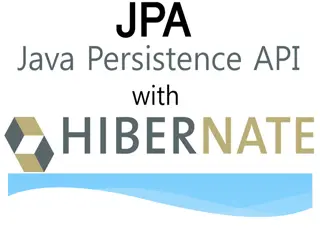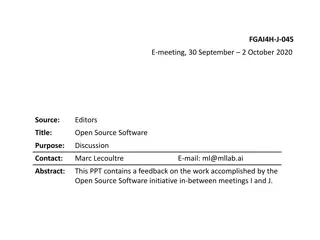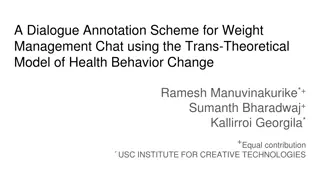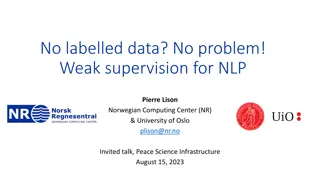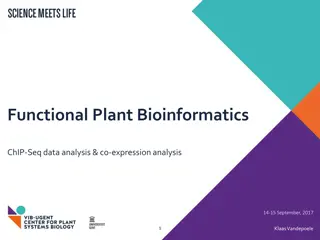Transforming Scientific Data Standardization with Large Language Models (LLMs)
Large Language Models (LLMs) to standardize scientific data, including data format standardization, automatic extraction of metadata, data annotation, data quality assessment, data cleaning, and documentation.
2 views • 5 slides
Revolutionizing Marine Mammal Detection using Geospatial Artificial Intelligence
Delve into the groundbreaking development of an operational system utilizing geospatial artificial intelligence to detect marine mammals in very high-resolution satellite imagery. Explore the global interest, monitoring platforms, proof of concept, limitations, future possibilities, and innovative a
0 views • 20 slides
Integrating UDL and Social Annotation Through Hypothesis Workshop
Learn how to incorporate Universal Design for Learning (UDL) principles with social annotation using Hypothesis Workshop. Discover the benefits of social annotation, ways to align it with UDL, practical assignment examples, and engage in interactive sessions. Join the workshop to enhance student eng
0 views • 38 slides
NCI Data Collections BARPA & BARRA2 Overview
NCI Data Collections BARPA & BARRA2 serve as critical enablers of big data science and analytics in Australia, offering a vast research collection of climate, weather, earth systems, environmental, satellite, and geophysics data. These collections include around 8PB of regional climate simulations a
6 views • 22 slides
Bioinformatics
Bioinformatics involves analyzing biological sequences through sequence alignment to uncover functional, structural, and evolutionary insights. This process helps in tasks like annotation of sequences, modeling protein structures, and analyzing gene expression experiments. Basic steps include compar
0 views • 6 slides
Ask On Data for Efficient Data Wrangling in Data Engineering
In today's data-driven world, organizations rely on robust data engineering pipelines to collect, process, and analyze vast amounts of data efficiently. At the heart of these pipelines lies data wrangling, a critical process that involves cleaning, transforming, and preparing raw data for analysis.
2 views • 2 slides
Data Wrangling like Ask On Data Provides Accurate and Reliable Business Intelligence
In current data world, businesses thrive on their ability to harness and interpret vast amounts of data. This data, however, often comes in raw, unstructured forms, riddled with inconsistencies and errors. To transform this chaotic data into meaningful insights, organizations need robust data wrangl
0 views • 2 slides
Tools for Better Remote Teaching and Learning with ZoomIt
Enhance your remote teaching with ZoomIt, a Microsoft-based screen zoom and annotation tool. Easily zoom in/out, annotate, markup, draw on screen, and capture notes in real-time. Access various options, set hotkeys, adjust zoom magnification, and utilize drawing modes efficiently to engage students
0 views • 5 slides
Annotating Your Design Work: Importance and Techniques
Understanding the significance of annotation in design work, this content emphasizes the value of providing short comments to explain design decisions. Learn how annotating your designs can enhance clarity, communication, and overall appreciation of your creative ideas.
0 views • 4 slides
Efficiently Grade Assignments with SpeedGrader in Canvas
Learn how to use SpeedGrader in Canvas to grade assignments quickly and effectively. Access SpeedGrader from your Dashboard or directly from assignments. Easily provide feedback, assign grades, and utilize annotation tools for detailed feedback.
0 views • 4 slides
Understanding Anthropometrics and Ergonomics in Design
Explore the principles, applications, and design influence of anthropometrics and ergonomics. Learn how data shapes our environment and enhances product quality. Discover the significance of anthropometric data and ergonomics in design, and engage in hands-on tasks to apply these concepts practicall
0 views • 9 slides
Understanding Data Governance and Data Analytics in Information Management
Data Governance and Data Analytics play crucial roles in transforming data into knowledge and insights for generating positive impacts on various operational systems. They help bring together disparate datasets to glean valuable insights and wisdom to drive informed decision-making. Managing data ma
0 views • 8 slides
Mastering the Literature Review Process
Understanding the significance of literature review, this guide emphasizes the essential steps involved in conducting a successful literature review - from planning and research problem identification to critical analysis and contribution to existing literature. It explains the importance of develop
0 views • 16 slides
Identifiers and Servers for Data Visualization and Exchange
Craig L. Zirbel at Bowling Green State University offers services through the BGSU RNA group for analyzing and annotating RNA 3D structures. They focus on Watson-Crick and non-Watson-Crick base pairs, base stacking, interactions, and motif searches. The group's ultimate goal is to predict 3D motifs
0 views • 31 slides
Engaging Literature Analysis Activities for Effective Learning
Explore activities like daily edits, memoir writing, annotation, vocabulary exploration, and identifying author's purpose and tone to enhance literary understanding. Encourage critical thinking and text analysis through engaging tasks.
0 views • 20 slides
AI-based Detection of Malaria: Overview and Challenges
This presentation delves into the utilization of AI for malaria detection, showcasing the background that led to the creation of TG-Malaria. Highlighting the current burden of malaria in Uganda and other developing nations, it addresses challenges in microscopy diagnosis due to a lack of trained tec
0 views • 20 slides
Understanding Data Collection and Analysis for Businesses
Explore the impact and role of data utilization in organizations through the investigation of data collection methods, data quality, decision-making processes, reliability of collection methods, factors affecting data quality, and privacy considerations. Two scenarios are presented: data collection
1 views • 24 slides
Corpus Creation for Sentiment Analysis in Code-Mixed Tulu Text
Sentiment Analysis using code-mixed data from social media platforms like YouTube is crucial for understanding user emotions. However, the lack of annotated code-mixed data for low-resource languages such as Tulu poses challenges. To address this gap, a trilingual code-mixed Tulu corpus with 7,171 Y
0 views • 10 slides
Enhancing Biological Context Annotation for AOPs: A Comprehensive Approach
Manual creation and homogenization of biological context annotations for AOPs and key events help in interlinking different AOPs to understand possible connections between pathways. The process involves compiling AOPs for various organisms, including humans and model species, annotating key events w
0 views • 13 slides
Understanding Bacterial Comparative Genomics: A Comprehensive Overview
Delve into the realm of bacterial comparative genomics with insights on terminologies, assembly methods, annotation processes, and two key approaches to microbial genomics. Explore the basics of genomics terminology, assembly-based and variant-based analyses, as well as annotation methods for protei
0 views • 41 slides
Innovative Tools and Approaches in Language Annotation and Visualization at CLARIN 2020
Presentations at CLARIN 2020 Session focused on annotation and visualization tools, including a neural syntax annotator for Dutch and German, exploring and visualizing Wordnet data with GermaNet Rover, named entity recognition for distant reading in ELTeC, and the semi-automatic analysis of spontane
0 views • 10 slides
Integrating CMDI for Metadata Editing and Kinship Data Annotation
Explore the integration of CMDI for metadata editing in resources, including open/closed vocabularies, Arbil interface for vocabulary management, ELAN for resource annotation, and KinOath for kinship data. Discover how CMDI improves data annotation and vocabularies management in linguistic research.
0 views • 10 slides
ELAN as a Tool for Oral History Workshop Summary
ELAN, a tool developed over 15 years at the Max-Planck-Institute for Psycholinguistics, is utilized in various research contexts like language documentation, acquisition studies, gesture studies, and sign language studies. The workshop covers the introduction to ELAN, basic and advanced features, an
0 views • 14 slides
Analyzing Argumentative Discourse Units in Online Interactions Workshop
This workshop delves into the analysis of argumentative discourse units in online interactions, emphasizing the segmentation, classification, and relation identification processes. It discusses challenges in annotation and proposes a two-tiered annotation scheme involving expert annotators and novic
0 views • 59 slides
GPress: A Framework for Querying Genome Annotation Files in Compressed Form
Genome projects generate large GFF files which require significant storage space. GPress offers a solution by compressing GFF files while allowing quick searches and random access. The framework addresses challenges faced by current GFF utilities, providing a more efficient approach to managing and
0 views • 24 slides
Overcoming Challenges in Dental Deep Learning: Presentation Insights
This presentation by Martha Büttner at the AI for Dentistry Symposium delves into current challenges in dental deep learning, highlighting issues like data sharing, annotation bottlenecks, and comparability gaps. The talk proposes a solution through Federated Learning, showcasing a project on Tooth
0 views • 17 slides
Harmonizing DICOM SR and AIM for Enhanced Clinical Annotation Workflow
Mechanisms like DICOM SR and AIM offer ways to encode annotations in medical imaging, each with unique benefits. The goal is to establish bi-directional mapping for interoperability between DICOM SR-based systems and AIM workstations, particularly for tasks like tumor measurements and clinical repor
0 views • 15 slides
Importance of Functional Annotation of Animal Genomes in NIH Research
Functional Annotation of Animal Genomes (FAANG) is crucial for associating sequence variation with quantitative phenotypes in domestic animals, serving as important models for human health, disease, and ecology. The NIH actively participates in various genome projects involving cattle, horses, and c
0 views • 10 slides
Advances in Digital Humanities: CLARIN2020 Sessions Overview
Presentations at CLARIN2020 highlighted enhancements to research tools, reproducible annotation services, and the transition to more generalized repository systems. Discussions encompassed the optimization of Wittgenstein research tools, reproducibility in WebLicht workflows, and the implementation
0 views • 13 slides
Automatic Extraction Model of Thesis Research Conclusion Sentences
Full-text academic literature contains rich data that can be analyzed using machine learning techniques. This research focuses on extracting thesis research conclusion sentences automatically to enhance summarization processes. The study involves data processing, annotation, and creating discriminan
0 views • 9 slides
Insights into 3D Chromatin Conformation Analysis
Chromatin conformation analysis is crucial for understanding gene expression dynamics. Today's program covers topics such as 3D chromatin organization, Hi-C method, biases in Hi-C data analysis, and integrated analysis of data sources. Techniques like Chromosome Conformation Capture Technologies and
0 views • 34 slides
Geospatial Video Search and Viewable Scene Modeling
Explore the innovative research on georeferenced video search and viewable scene modeling. Learn about automatic annotation, camera direction modeling, data acquisition, and indexing for enhanced video retrieval. The study focuses on capturing the field-of-view, meta-data acquisition, and synchroniz
0 views • 15 slides
Cognitive Study of Subjectivity Extraction in Sentiment Annotation
A cognitive study on extracting subjectivity in sentiment annotation, exploring if humans perform subjective extraction similarly to machines for sentiment analysis. The study investigates sentiment oscillations and different methods adopted based on the nature of subjective documents.
0 views • 14 slides
Analyzing Representation of Sex Scenes in Ghanaian Films
Exploring the portrayal of sexual intercourse in Ghanaian films against cultural values, this study introduces a multimodal annotation scheme for analysis. Addressing concerns raised by the public, it delves into the complexities of conveying sex in a culture that tends to discourage open discussion
0 views • 12 slides
Understanding Java Persistence API (JPA) for Data Management in Java Applications
Java Persistence API (JPA) is a specification that provides a framework for managing relational data in Java applications. It simplifies ORM solutions, offers vendor independence, and supports test-driven development with annotation-driven mapping.
0 views • 31 slides
Open Source Software Initiative Progress Update
The Open Source Software initiative progress update provides insights into the work accomplished during e-meetings, focusing on the development of a modular annotation tool shared by a focus group. The group's activities, such as drafting requirements, analyzing survey results, and setting up collab
0 views • 9 slides
Dialogue Annotation Scheme for Weight Management Chat
Obesity is a prevalent issue with individuals seeking ways to change their health behaviors. The article explores a dialogue annotation scheme using the Trans-Theoretical Model of Health Behavior Change. It delves into stages like precontemplation, contemplation, preparation, action, and maintenance
0 views • 11 slides
Weak Supervision for NLP: Overcoming Labelled Data Challenges
Addressing the challenge of acquiring labelled data for NLP models, weak supervision techniques offer solutions through alternative annotation methods and leveraging diverse data sources. This talk highlights the importance of overcoming the scarcity of labelled data in machine learning and NLP task
0 views • 18 slides
Plant Bioinformatics Studies on ChIP-Seq Data Analysis
Plant bioinformatics researchers conducted experimental analyses and mapped gene regulatory networks using ChIP-Seq data. The studies involved exploring gene expression, regulatory interactions, and transcription factor binding sites. Techniques such as peak calling, motif finding, and peak annotati
0 views • 19 slides
German Discourse Blog Corpus Compilation & Annotation
Compilation and annotation of a discourse-structured blog corpus for German, involving data collection, annotation, addressing specific problems, and planning next steps. The project focuses on fostering interoperability, meeting requirements, and developing models for annotating blogs' structural a
1 views • 39 slides

